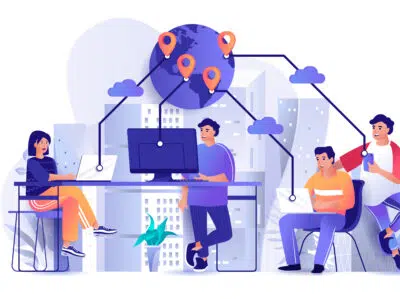What happens when organisational boundaries start blurring?

Leveraging social media platforms for talent acquisition
October 17, 2023
Why is employee autonomy at work so important?
October 17, 2023
There is a new expression that has dropped into corporate-speak and is amplified across conference rooms, seminars, coffee shop pow-wows and, of course, social media—the “blurring boundaries” of organisations. What is it all about?
A Deloitte study says: “The fundamental boundaries that have specified the relationships, interactions and possibilities of most businesses are rapidly blurring and dissolving.”
Significantly, the paper goes on to add that driving this phenomenon is “rapid technological advancement.” Here are a couple of ways in which blurring boundaries play out on ground.
Seamless but not entirely for the better
If you belong to a generation prior to millennials, you might recall a time when weekday mornings started with an energising breakfast before leaving for office and evenings were relatively work-free. With the internet and mobile phones bringing 24x7 connectivity and working on-the-go becoming an acceptable norm, that comfortable routine was rendered passé. Technology erased the line between work and leisure time. Now, the pandemic and the “new normal” it entrenched—work-from-home and hybrid working—have further contributed to the dissolution of the boundaries between work and personal life.

There are appreciable points to these changes. For many employees, the flexibility inherent in these new routines meant a better work-life balance. Remote employment benefited both companies and employees. However, the blurring of geographical and in-office boundaries also had an unforeseen and sometimes disastrous consequence—employee burnout, which plays out through multiple negative fallouts:
- No recovery time with work schedules invading personal time
- High stress levels or exhaustion due to employer expectations of being accessible even after working hours
- Low scope for enriching personal life with limited time available for investing in other interests and fulfilling relationships
For HR professionals, the challenge is to harness the advantages of these blurring boundaries while also addressing the detrimental fallout of tech-driven change like burnout and “quiet quitting”. Some simple initiatives that progressive companies can adopt are:
- Setting up support helplines for employees
- Allowing workers to occasionally take time off during the week to spend quality time with families
- Assuring employees that leaving early after completing a day’s work will not attract bias
Blurring organisational boundaries
When technological advances were slower and less disruptive, everyone in an organisation knew where they fitted in and what they were expected to do. Layers of authority were structured, and decision-making processes followed a plan. In brief, every organisation had clear-cut boundaries. Now, fast-growing technology frequently disrupts the business world, changing the rules of the game in unpredictable ways. Rigid, slow-to-react organisational structures simply cannot cope with nimbler rivals. To stay relevant and beat the competition, skills, teamwork and collaboration have perforce taken precedence over pedigrees and fixed job roles and responsibilities.
Does this flexible new approach succeed? Yes, but ironically, only if business leaders put in place a new set of boundaries to replace the old ones. Because no matter what technology dictates, human beings, it appears, do need a framework within which to function. Here is one example:
In this brave new world, members of a team, theoretically speaking, all enjoy equal status. In reality, though, a group consisting of, say, younger employees, experienced seniors and headed by a manager is highly likely to encounter conflict and misunderstandings due to team members’ differing perceptions of their status and identities. Solutions? A Harvard Business Review recommends that leaders set “psychological boundaries” that enable teams to interact appropriately and work in unison. A manager, for example, when queried by a skilled junior, ought not to feel that his experience or position is being questioned or undermined. Furthermore, when employees with varying skills team up, they must focus on their own tasks as well as others' work. For every team member to be confident about their role and invested in the project, responsibilities must be clearly defined and resources equitably shared.
Tech-driven disruptions are not going away. But it pays to remember the French saying, “Plus ça change, plus c'est la même chose.” Organisations have changed but human nature itself is immutable. For employers, the challenge is to embrace the positives of change while never losing sight of the human factor.
Sources:


